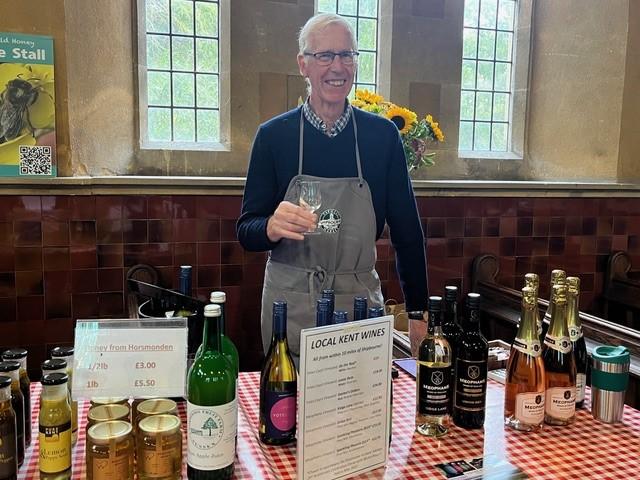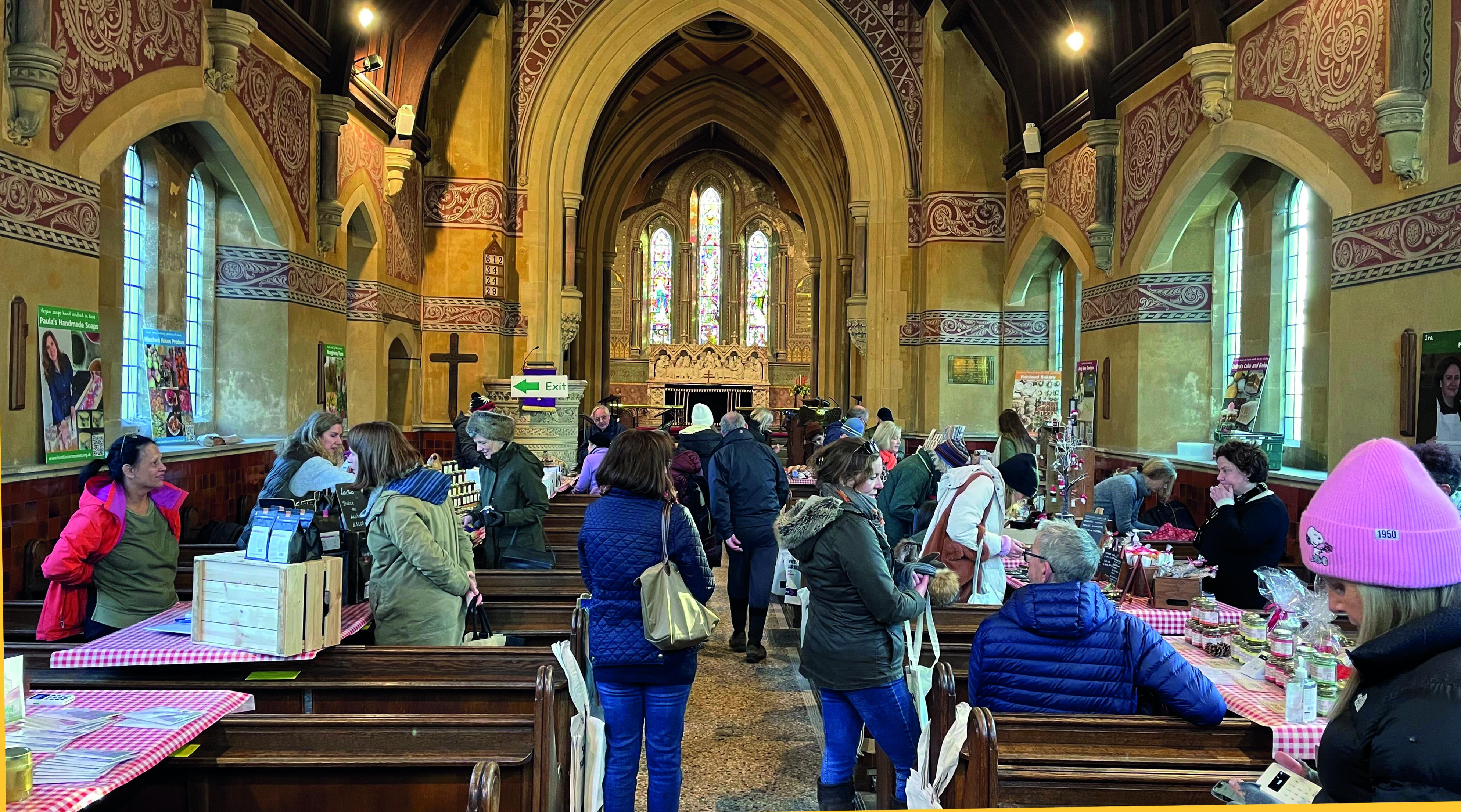St Giles’ Church in Shipbourne, Kent, hosts a weekly farmers' market that gives the community an opportunity to come together and for local producers to sell their goods. It is a lifeline for the village, which has no shop, and all of the market’s proceeds are split between the church and agricultural charities. Find out how the farmers’ market has developed over time, and what they describe as the keys to their success.
Back in 1285, King Edward I granted the village of Shipbourne, Kent, permission to hold a weekly market. Centuries later, in May 2003, it was re-inaugurated as a farmers’ market, taking place at St Giles’ Church every Thursday. Today, the market continues, and plays an important role in the church and the local community.
Making use of the church building
St Giles’ is a beautiful Grade II listed estate church in the small Kent village of Shipbourne. There are no shops in the village, so, like in so many other villages, the church and the nearby pub form the central hub for the local community.
It was a group from the church that originally set up the new incarnation of the market, so the St Giles’ was the natural place to host it. Two decades later, the relationship remains strong.
“We’re essentially a subsection of the church. It works perfectly for us because we don't pay anything. But on the other hand we do give quite a lot of money to the back to the church,” explains Bob Taylor, the market manager at Shipbourne.
“Then in terms of how it works, there are around 15 to 20 stalls. We have to have some outside, like meat and fish, because you don’t want the smell inside the church. But then some are inside, including the coffee corner. We put boards on the pews to create the surfaces. And some of the pews are on little wheels so we can move them.”
The farmers’ market provides a regular source of income for the church, which can be really helpful. But it also has wider benefits.
“The community has taken the market to heart basically. It is the focus of the community,” continues Bob.
“On a Thursday morning, everybody comes here to the market and for coffee as well. On average, we get about 150 people at the market every week.
“Part of the main purpose originally was to bring more people into the church.
“In this sense, the market has been a huge success. It’s definitely meant more people visiting the church, because people just get used to it. They get used to going in the building. It's not a daunting thing for them. They go in and have coffee there and it's just normal. It's brilliant.
“When people come in [for the first time], they're just amazed at the what's in the church and take lots of photographs. And so, we get locals coming in who’d never even dream of going to church, as well.”
Support from the congregation and the community
Volunteers are crucial to the success of the farmers' market. There is a lot to do in preparation for the market each week, and helpers also play a role in greeting customers and helping them at the market.
“We don’t ask the producers to put their own gazebos or tables up, because it takes so long. So, we actually do that all before they arrive,” explains Bob.
Without their help, week in and week out, the market wouldn’t be able to happen.
“The first volunteers arrive at the church at around six o’clock in the morning to begin setting up. We bought the tables and the gazebos. It is quite unusual, but it just saves the producers time when they arrive,” Bob shares.
“There are other important jobs, too. We have one person who is the greeter, who helps people across the busy road.”
With so many tasks, the market is fortunate to have a good supply of volunteers. But one of the biggest challenges is finding people who can commit enough time to take on larger tasks.
Recruiting volunteers is important for so much of what churches do. For any regular event, like a market, having enough volunteers to plan around holidays and other absences, and understanding how much they want to get involved, is key.

Working in partnership
Another key to the success of the farmers’ market at St Giles’ has been partnerships with other organisations. For small, volunteer-led groups that don’t always have the resources to do things in-house, support from a network of partners can be valuable.
“One of the key things any farmers’ market requires is good parking,” says Bob.
“You can’t expect people to carry produce long distances to and from the market every week. We don’t have parking, so theoretically, it shouldn’t work. But, we came to an agreement with the pub next door, to let the producers park there during the market. It works quite well because the market takes place in the morning when the pub isn’t busy.”
The church also enjoys support from the Kent Farmers’ Market Association, which Bob is also involved with.
“The Kent Farmer’s Market Association has a big online database of producers all over Kent,” Bob explains.
“There are around 500 in total, and when a new one gets added, an email goes out to all of the market managers to let them know. So we work with them to find new producers for the market.”
Marketing makes the difference
Although the farmers’ market at St Giles’ Church has engaged locals, they are keen to attract people from further afield, too.
“Marketing is absolutely key,” says Bob. “You really have to have people on board.”
Getting the message out there doesn’t have to rely on money. There are plenty of creative ways to find new customers.
“We use other parish magazines as a way to promote the market,” shares Bob.
“Every month, we write an article for them, about what’s in season and seasonal recipes. It works quite well, because they’re often keen to fill the pages with articles, rather than just adverts.”
Over the years, they have also made sure to keep up with changing technology.
“In the early days it was parish magazines and banners and boards everywhere. But now, it's mainly Facebook,” concludes Bob.
At St Giles’ Church in Shipbourne, the farmers’ market has proven to be a long-term success. Thanks to relationships with other organisations, a team of dedicated volunteers and some creative marketing, it has gone from strength to strength as a big part of community life. It provides an opportunity for local businesses to grow, and creates extra revenue for the church, as well as bringing more visitors in.
For Churches: Top tips for your place of worship
-
Consult your community. The market at Shipbourne works because it’s what the community and local farmers and businesses need. Before you launch a market, make sure you involve your community in what they would like to see and find out what’s on offer locally to sell.
- Build relationships with other organisations. Limited resources can make everything feel more difficult. But that’s where other organisations may be able to help. Speak to other businesses and seek out support online. People are often willing and able to help.
- Volunteers are key. Make sure you recruit a team that will be able to assist with setting up and during the market. It’s also important to understand how much time volunteers can commit. You can learn from St Hilda in Redcar about how to recruit volunteers.
- Tell people what you’re doing. A market needs marketing. Attracting customers to a market at your church relies on getting the message out there. Think creatively about who you want to attract and where you can find opportunities to engage with them. Making use of digital platforms like social media will also help you to reach a wider audience.

